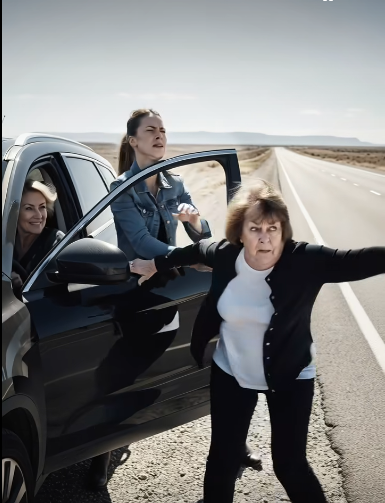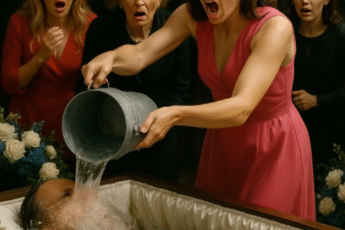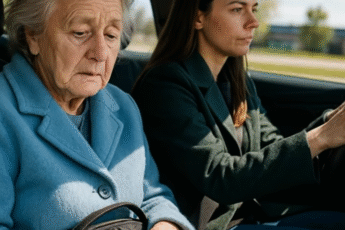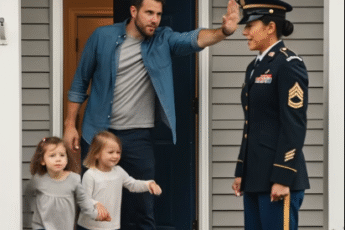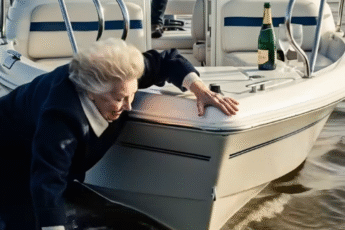The morning air felt crisp, a fragile promise held in the plush back seat of Khloe’s SUV. The Metobrook Drive residence, my home for decades, receded in the rearview mirror, but my heart was light, unburdened by nostalgia. It was filled with a simple, pure anticipation for the family reunion. My daughter-in-law, Khloe, had been so insistent, her voice a melody of cheer as she’d planned the trip, talking about catching up with cousins I hadn’t seen in years. Brenda, her mother, sat beside me, a faint, knowing smile playing on her lips. She was quiet, but Brenda was often quiet. I chalked it up to her usual reserved nature.
“Are we sure we’re taking the scenic route, Khloe?” I asked, adjusting the faded leather of my purse on my lap. The miles were ticking by, yet I recognized nothing.
“Oh, absolutely, Eleanor,” Khloe chirped, her voice a little too bright. “Brenda found this amazing shortcut. It’ll be an adventure.”
Brenda just nodded, her gaze fixed on the asphalt ribboning out before us. I leaned back, content. I’d brought along a dog-eared road atlas, a relic from another time, but I trusted them. This was a weekend for warmth, for closeness, a chance to see my son, David, more than the fleeting, distracted visits that had become our new normal. The sun glinted off the dashboard, and I hummed a little tune, completely oblivious to the storm gathering just over the horizon.
The hum of the tires on the asphalt was a lullaby. I’d drifted, lost in pleasant thoughts, picturing the faces of nieces and nephews, the easy laughter of family. Then, without warning, the SUV lurched to a sudden, jarring halt that sent my purse sliding to the floor. The engine sputtered, coughed, and died.
The silence that rushed in was deafening, broken only by the tick-tick-tick of cooling metal.
“What is it, Khloe?” I asked, a knot of confusion tightening in my stomach. We were nowhere. Just miles of scrub brush and an endless, indifferent sky. The sun, once so inviting, now felt hostile.
Khloe turned in her seat. The cheerful mask was gone, replaced by something hard, something unreadable. Brenda remained a statue, her gaze fixed straight ahead.
“Well, Eleanor,” Khloe began, her voice losing its lilt, becoming flat, almost bored. “Brenda and I have decided this isn’t going to work out.”
I blinked. “Not going to work out? What are you talking about, dear? The reunion?”
Brenda finally spoke, her voice low and devoid of all emotion. “We’re not going to the reunion, Eleanor. And you’re not going anywhere with us.“
A bizarre joke. It had to be. “Oh, you two,” I chuckled, trying to puncture the tension. “Trying to scare an old woman. Very funny. Now, let’s get going, we’re losing daylight.”
No one laughed. Khloe reached over and unbuckled her seat belt. Brenda did the same.
“This is it, Eleanor,” Khloe said, her voice chillingly calm. “This is where you get out.”
My breath hitched. “Get out? Khloe, where are we?” I looked around frantically. The highway stretched into the shimmering heat in both directions. Nothing. No houses, no signs, no life.
“We’re a long way from home, Eleanor,” Brenda added, her voice like ice. “About 490 kilometers, give or take.”
The number hit me like a physical blow. This wasn’t a joke. Tears pricked at my eyes, blurring the harsh landscape. “But why?” My voice was a whisper. “What did I do?”
Khloe opened her door, and the hot, dry air rushed in like a predator. “It doesn’t matter what you did, Eleanor. It’s what we’re doing. We’re done. We’re done with you.” She looked at Brenda, a strange, triumphant glint in her eyes. Then they both looked back at me, their faces twisted into masks of cruel amusement.
“Figure it out, mother-in-law,” Khloe spat, a harsh laugh escaping her lips.
“Yeah,” Brenda echoed, her voice a mocking blade. “Figure it out.”
They slammed their doors. The engine roared back to life, a sudden, violent sound in the oppressive silence. I watched, frozen in a paralysis of disbelief, as the SUV lurched forward, kicking up a cloud of gravel and dust.
“No, wait!” I cried, my hand fumbling uselessly for the door handle.
They didn’t look back. They didn’t slow down. They just drove, a receding speck in the shimmering heat haze, leaving me standing on the side of a deserted highway, utterly and completely alone. Their laughter seemed to echo in the vast, terrifying silence that followed.
The silence after they disappeared was a physical thing, a heavy blanket smothering the already oppressive heat. My mind, usually so sharp, felt like a scrambled egg. I was 72 years old, not exactly equipped for a desert survival mission. Panic, cold and sharp, began to prickle at the edges of my composure.
Just as a sob threatened to break free, a flicker of movement down the highway caught my eye. A patrol car, a mirage of hope. I raised a trembling hand, waving frantically. The car slowed, its window rolling down to reveal a uniformed officer. His name tag read Ramirez. He looked weary, as if he’d seen every kind of human failure the desert had to offer.
“Everything all right, ma’am?” he asked, his voice calm, professional.
The words tumbled out, a messy confession of betrayal. “My daughter-in-law and her mother… they just left me. They just drove off.”
He listened patiently, his expression unreadable. He wasn’t surprised, which somehow made it worse. After relaying my name, Eleanor Vance, over his radio, he turned back to me.
“Okay, Eleanor, they’ve put out an alert, but honestly, ma’am, this is pretty far out. You’re a long way from anywhere.” He paused, his gaze sweeping the desolate landscape. “Best advice I can give you is try to find some shade, conserve your energy, and be careful. This isn’t the safest place to be stranded.”
He didn’t offer a ride. He didn’t offer water. He just offered a stark warning and drove away, leaving me once again in the suffocating silence. His words, a long way from anywhere, echoed in my head. I had to figure this out. I had to survive.
Shimmering in the heat haze was a sign, its paint peeling but legible: Starlight Motel. It looked like a place that held forgotten stories and cheap disinfectant, but it was a roof. It was my only option.
The walk was an agonizing crawl through thick, hot air. When I finally pushed open the door, a weak bell jingled. The woman behind the counter had tired eyes and a hairstyle that had given up years ago. “Need a room?” she asked, her tone flat. I pushed my few remaining bills across the counter. It was enough for one night.
My room was small and sparse, a sanctuary from the brutal sun but not from my crushing despair. The memory of Khloe’s cruel laughter and Brenda’s icy voice played on a loop in my mind. They wanted me to suffer. And here, in the Starlight Motel with its flickering sign and stale air, I was. The long, hard road ahead stretched out before me, as vast and unforgiving as the desert outside.
I couldn’t just sit there and waste away. The next morning, fueled by a flicker of defiance, I pulled out my dog-eared road atlas. The number—490 km—mocked me from the page. I needed food, but more importantly, I needed a plan.
A short walk down a dusty road led me to a sign for The Cozy Corner Cafe. Pushing open the door, I was met with the comforting aroma of coffee and bacon, and the low hum of human conversation. Behind the counter, a woman with kind eyes and a warm smile wiped down the surface.
“Well, hello there,” she said, her voice soft. “Haven’t seen you around before. You look like you’ve had a long day, honey. Coffee’s on the house.”
Tears pricked my eyes. This simple offer of kindness felt like a lifeline. The woman, Sarah Jenkins, brought me a steaming mug and a plate piled high with meatloaf and mashed potatoes. She didn’t pry, but as I ate, the dam broke. I told her everything. The reunion, the drive, the abandonment.
Sarah listened patiently, her hand occasionally resting on mine. She didn’t offer easy answers, but she offered something far more valuable: a sympathetic ear. And as I poured out the whole sorry story, the sheer injustice of it all, a different kind of fire began to burn inside me. Not the panic of being stranded, but a steady, determined flame.
“You need a plan, Eleanor,” Sarah said softly, as if reading my mind. “Sitting here waiting for someone to rescue you, that’s not going to work out here.”
She was right. My life, my reputation, my dignity—they had tried to steal it all. But they hadn’t succeeded. Not yet. I wasn’t going to be a ghost, forgotten and left behind. This wasn’t just about getting home anymore. It was about making them pay.
My initial shock was giving way to a steely resolve. The game had changed, and thanks to the unexpected kindness of a stranger, I was finally ready to play.
The next few weeks were a blur of gritty survival and meticulous planning. Sarah gave me odd jobs at the cafe—washing dishes, wiping tables—and the small wage was a start. I weeded Mrs. Gable’s garden and sorted inventory for Mr. Henderson at the hardware store. Each dollar earned was a small victory, a tiny step away from the helplessness I’d felt on that highway.
My real work, however, happened at the Oak Haven Public Library. Day after day, I sat at a public computer, teaching myself how to navigate the digital world. I was no longer a victim; I was a strategist, an investigator. Knowledge was my weapon.
Sarah knew a guy who sold a used laptop for fifty dollars. It felt like a king’s ransom, but carrying it back to my dingy room at the Starlight Motel felt like carrying a secret weapon. My motel room became my command center.
I started digging. I found a business listing for a company called Sterling Solutions, with Khloe’s name listed as CEO. Their website was slick, professional, full of corporate jargon about synergy and disruptive innovation. But I knew what lay behind the polished facade. I found local news articles, buried deep, that told a different story: shady investment practices, lawsuits from disgruntled investors, money disappearing into a complex web of shell corporations. Brenda’s name was all over it.
Then I found the social media underbelly—private forums and complaint boards where former employees, silenced by NDAs, shared their stories. They painted a picture of a marriage on fire, of Khloe’s volcanic rages and David’s cowed submission. They were living a big, flashy, expensive lie, and it was cracking under the pressure.
One evening, I was at the community center, using their free Wi-Fi, when I overheard them. Khloe’s voice, ragged with a panic I’d never heard before, drifted from a conference room with its door ajar.
“No, you can’t do this to me! Not now!” she hissed into her phone. Then David’s voice, sharp and angry. “You promised me, Khloe! You guaranteed this would be a clean exit!”
“David, please,” she sobbed. “We need to figure this out. They’re talking about fraud. Actual fraud.”
“Fraud? You’re the one who messed up!” he shot back. “And now Brenda’s gone silent. Just like that.”
I gripped the edge of the table, my knuckles white. This was it. The messy, ugly truth. It wasn’t just about abandoning me. It was about a whole life built on deceit, and it was all coming undone.
I didn’t go to the police. Not yet. This needed to be more personal, more devastating. I drafted a letter to David, not accusing, but laying out the facts I’d discovered, asking him a simple question: What have you done?
The letter to Khloe and Brenda was harsher. It was a detailed account of their scheme, complete with printouts of the investor lawsuit. I made it clear: I knew everything. There was nowhere left to hide.
I lured Khloe to a final confrontation at an upscale restaurant, the Willow Creek Bistro, with the promise of a “peace offering.” She brought Brenda. I brought my laptop and an envelope.
“I wanted to talk about David,” I began, my voice low but carrying a new weight. “About what you both did.”
I turned the laptop around, showing them the folder labeled Sterling Solutions: The Truth. I played them the news articles, the employee complaints, the details of the shell corporations linked to Brenda. I watched the color drain from their faces, their carefully constructed composure shattering like cheap glass.
“What’s inappropriate,” I said, my voice steady, “is building a life on lies. You abandoned me. You treated me like I was nothing. And for that, there has to be a reckoning.”
They fled the restaurant, leaving me alone at the table with the quiet hum of my own vindication.
The anger and bitterness had been a necessary fuel, but now they were spent. What remained was a quiet determination. I had my dignity back. I had my story. And I had the freedom that came with knowing I had done what was right, no matter the cost. The future was uncertain, but for the first time in a long time, it felt like mine. It was a new dawn, and I was ready to greet it. Not as a victim, but as Eleanor, whole and unbowed.
